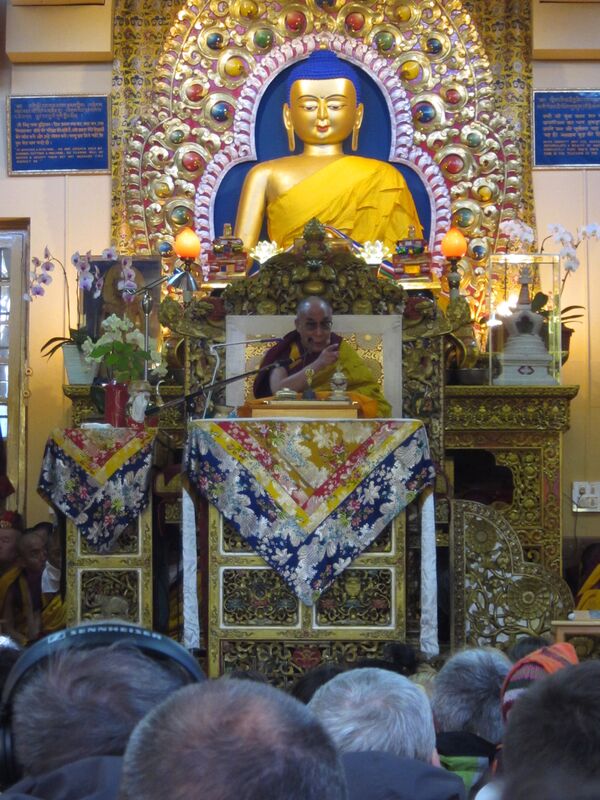Tibet’s spiritual leader, the Dalai Lama, has called on people to think more of the entire world they live in rather than caring about their own interests first as a way out of the global crisis.
“At the Copenhagen summit on climate change some participant countries showed that their own interests are more important than interests of the whole world,” he said.
Avarice and shortsightedness were to blame, the Dalai Lama said adding people were guided by emotion and did not think of the long-term consequences.
“Ecology and global warming - for these problems there cannot be any interstate borders, they must concern the whole world,” he said.
He made his comments at a meeting of over 7,000 pilgrims from Russia, India, China, Mongolia, Japan, the United States and other countries for religious teachings held on December 19-21 in his Indian residence in Dharamsala in the northern state of Himachal Pradesh on a request from Russian Buddhists.
Russia’s Buddhist republics have had close relations with Tibet, and it is good that interest in Buddhism in these regions is growing, the Dalai Lama told RIA Novosti in an exclusive interview.
Among those pilgrims were some 1,500 people from the traditionally Buddhist Russian regions of Buryatia, Kalmykia, Tuva, as well as Moscow, St. Petersburg and the Urals city of Yekaterinburg.
The Dalai Lama, whose name is Tenzin Gyatso, held special teachings for Russian Buddhists for the third time.
“I always tell people from Buddhist regions that this is [the] religion of our ancestors… They must simply preserve all our own ancient traditions. I am very happy that interest in Buddhism in these regions of Russia is growing and they find something relevant for them in this religion,” the Dalai Lama told RIA Novosti.
“Buddhist republics in the Russian Federation [over the] last several centuries had very, very close ties with Tibet. A number of Buddhist scholars and masters came from this area… There were outstanding scholars, wonderful masters who came from your country. So we always had special, close relations,” he said.
“Secondly, before the Russian revolution, the Thirteenth Dalai Lama had contacts with the Russian Tsar [Nicholas II]. In Norbulingka (the Daiali Lama’s summer palace in Lhasa) there are gifts presented by [the] Russian Tsar to the Thirteenth Dalai Lama,” he said.
“When I meet Russians, they always recall my predecessor and I feel there is some connection between us,” he said.
The Dalai Lama’s December meeting with Russian pilgrims was the first since he retired as the political leader of the Tibetan community in exile in March 2011. He explained his retirement from political life.
“Since my childhood I understood that the Tibetan system of government has a lot of drawbacks. In 1959, as soon as we came to India, our political structure began to change towards democracy. In 2001, it was the first time we had [an] election of political leadership,” the Dalai Lama said.
“[For the] last 400 years the Dalai Lama automatically became [the] head of a government in Tibet. This system is outdated. We must change it since the people are the owner of a country,” he said.
“I am retired already for 10 years and all this period all the political decisions were taken by [an] elected political leadership, not by me.”
“But I still remain Dalai Lama. And my responsibility is to promote universal human values - to make happy different peoples, families, societies. I am also committed to promote harmony in relations between different religions,” the Dalai Lama said.
“To establish harmony in these relations, we need to learn other religions. If you focus on traditions of different religions, you’ll see that there are many similarities. If there are some ‘bad’ people among representatives of one religion, one must not judge by it about religion as a whole,” he said when asked how to cope with persecution of Christians in Africa and the Middle East.
“When people live in isolation without contacts, then unfortunately some people can use religion to satisfy their own political or economical ambitions,” the Dalai Lama said, urging believers to be sincere.
“To be religious or not it is a personal choice. You may be atheist but you have to remain a sensible and responsive human being. But once you accept any religion, then you should be serious and sincere,” he said.
Tibetans revere the Dalai Lama as a manifestation of Avalokiteshvara or Chenrezig, the Bodhisattva of Compassion and patron saint of Tibet. Bodhisattvas are enlightened beings who have postponed their own nirvana and chosen rebirth in order to serve humanity.

